One unfortunate fact of life is that we all have to say goodbye to beloved family members at one time or another. When your cat is in her final days, it’s only natural that you start looking for ways to provide some comfort in those last moments that you can share together.
This article covers everything you can do at home to help sick and dying cats get through the day with as little discomfort as possible. Since it can be difficult to recognize when a cat is dying, let us start by examining some typical symptoms to look out for.
Symptoms of a dying cat
- Behavior: A dying cat will lose interest in social interaction and games. You may also notice their appearance declining, as they can no longer have the energy to properly groome themselves.
- Appetite: One of the key things to look for is a loss of appetite and accompanying weight loss. When organs start to shut down, so do feelings of hunger and thirst.
- Body temperature: Healthy cats have a body temperature of around 100 degrees fahrenheit, but the temperature of a dying cat can get much lower. You can take your cat’s temperature with a thermometer, or attempt to feel a difference with your hand.
- Seclusion: This is an instinctive response to suffering and protects a dying cat from other animals. If your cat disappears for long stretches, know that this is a symptom of pain, rather than an intentional way of ignoring you.
If you recognize these signs, here’s everything you can do to support your cat:
A trip to the vet
Whilst we have a lot laid out for you in the following paragraphs, the first and most important thing you can do for your cat is take them to a healthcare provider.
Dying cats are often in pain, and the veterinarian will be able to prescribe some effective painkillers that can be of tremendous help in alleviating some of the pain. Your vet may also be able to help prepare for things you’ll have to deal with in the coming days and weeks, such as incontinence and a loss of appetite.
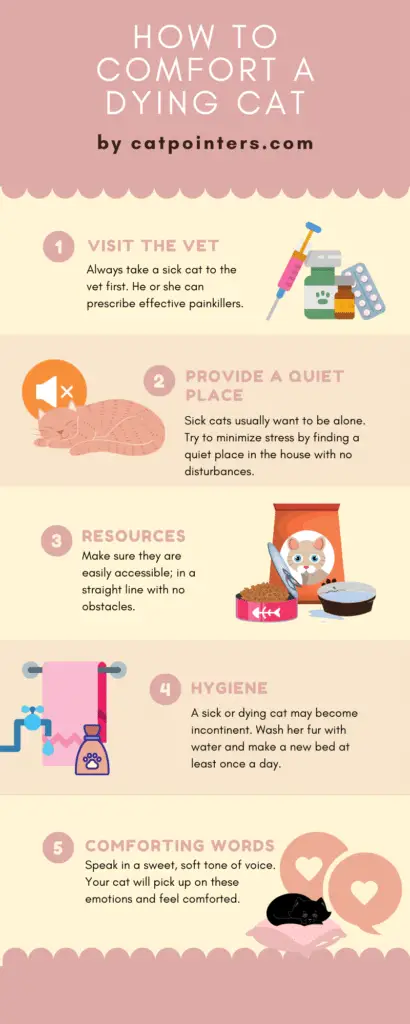
Loss of appetite
Cats that are towards the end of their life may lose all interest in food. One of the ways to take care of a dying cat is through force-feeding. If this feels cruel or unhelpful, try to think of it as a way to help your pet be less hungry.
You can force-feed either with your bare hands or by using a syringe. Depending on the situation, a bland diet might be a good choice for sick cats. Things such as baby food or some soft-boiled chicken are easy to chew, swallow and digest.
If you can’t get bland foods, another possibility is to put their regular meal in a blender or food processor with some water added. The resulting mix is a lot easier to swallow and digest. Since most cats don’t drink enough, this will also help your kitty stay hydrated.
Clean sheets
As a cat approached the end of its life it will typically become incontinent. If this is the case, make a habit of providing your cat with a clean bed at least once, but preferably several times, a day. We recommend using something soft and comfortable, like Chewy’s orthopedic pillow with removeable cover.
Alternatively, you may also utilise extra soft towels if you have a few lying around. Remember to throw these into the washing machine often to wash out all the bad odors.
Frequent washing & grooming
Most cats don’t like getting wet (although there are exceptions, like the Maine Coon and Bengal). Nevertheless, you’re doing your cat a favor by washing their coat frequently to remove urine and prevent infections.
Whenever you make a clean bed, also wash your cat’s belly and sides with a mixture of lukewarm water and a few drops of pet shampoo (do make sure it’s vet recommended shampoo, like this one). While you’re at it, check for mats in the coat and brush them out.
If your cat is too uncomfortable with these procedures, a few affirmations spoken in a soft and gentle tone of voice may put them more at ease. Alternatively, you can ask your vet to provide you with some special diapers for sick cats.
A quiet place
Cats that are in pain have a natural inclination to remain solitary. A severely sick or dying cat feels very vulnerable and will therefore be most comfortable when there are no other people or animals are around. Find a place in your house that’s relatively quiet. Ideally this would be a room where your cat can’t be disturbed by children or other pets.
Biologists believe the reason for this voluntary confinement is to be found in evolution. Out in the wild, cats face numerous threats from predators looking for a chance to invade their territory. A wounded animal makes for an obvious target, so to a cat’s mind, it can’t afford to show any signs of struggle or weakness to others. Hiding is therefor the best strategy.

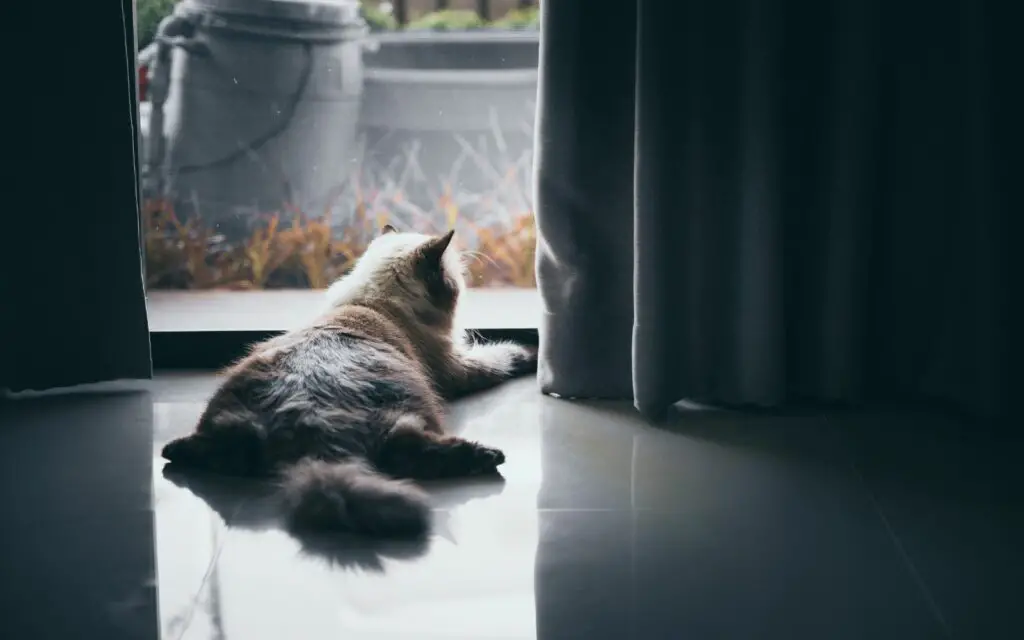
Body temperature
Sick cats are often unable to maintain an appropriate body temperature, so be sure to pick a place that’s warm enough. You should make sure that the area is at least 68 F (or 20 C) throughout the day.
Installing a small heater could prove useful if your room is on the chilly side during this time of year, but don’t place the heater right next to your cat as doing so could lead to dehydration.
Food, water and other resources
Resources are one of the most important things to get right. Sick cats are best granted easy access to their key resources, which are food, fresh water and fresh litter.
- What to feed a sick or dying cat?
Wet food is often more palatable and easier to digest. If your cat always eats dry kibble, you can try to mix a little wet food into their meal and see what the response is. For cats that are experiencing stomach issues and/or vomitting, a diet of bland food may prove easier to feed and will provide the gastrointestinal tract some time to recover. But you should never give such food to a cat for extended periods, as bland foods rarely contain all the nutrients that the feline body needs. - Make resources easily accessible
A sick cat may struggle to get up, so make sure that all the vital resources can be reached easily and are within eyesight. Water, food, and the litter box should all be accessible without having to maneuver around obstructions. - Remove competition
Cats experience stress when having to compete over their resources. If you have other pets, it’s probably a good idea to close off the room in order to prevent them from coming in and eating or drinking from the bowls, or using the same litter box.
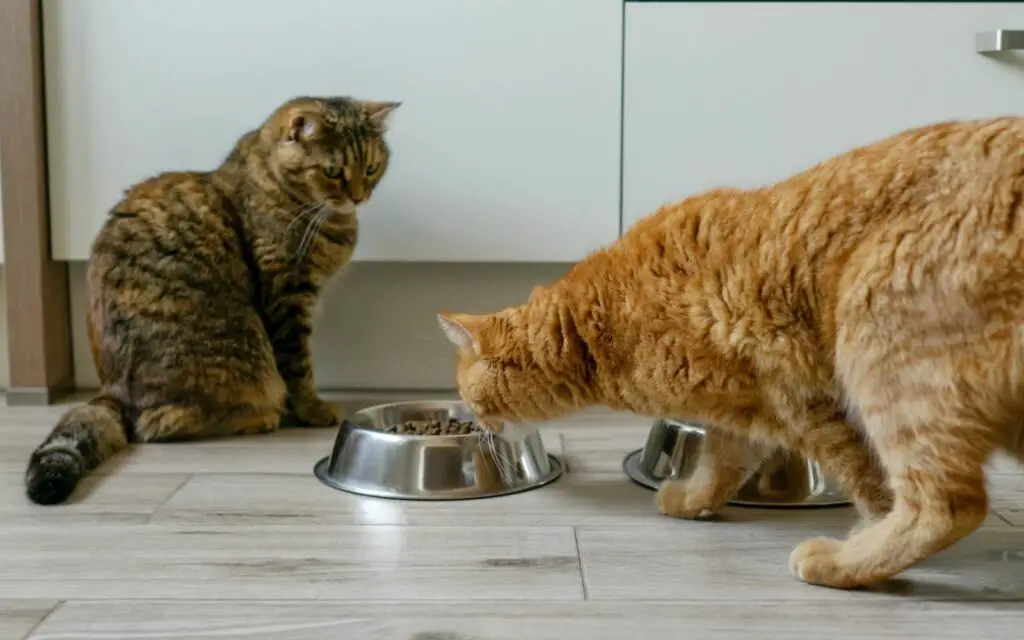
Words of comfort
One thing that many cats find difficult is to show you that they want affection. We humans can use our words and our body language to show others that we feel down, but cats are not nearly as expressive. So there’s a good chance that you may have to take the initiative here and offer some words of comfort yourself.
Since most people don’t know how to comfort a sick cat, here’s an idea to set you in the right direction: try to imagine how you would like to be treated when you are in pain. Your cat probably wants the same things! You can help it be more at ease by spending time with it, and by gently stroking and talking to it.
Cats may not understand your words, but they can definitely pick up on the emotions that are reflected in them!
When it’s time to let go
Even with the best possible care, a terminally ill cat will eventually pass away. If you visit a veterinarian (which we always recommend when a cat is ill), he or she will probably want to evaluate the cat’s overall health frequently.
Difficult as it may be, you should definitely skip your own judgment and leave this to a vet. Even with your best intentions, you can’t make these kinds of evaluations on your own.
The vet may conclude that there are more good days yet ahead. But if your cat has stopped eating completely, or has developed serious respiratory issues, it’s probably best to let go.
And then.. ?
You lost a dear friend. A companion who was always waiting for you after a long day at work. Perhaps your cat even cuddled with you on the couch every day. It’s perfectly normal to go through a period of grief after losing a beloved pet. Some people even experience harsh feelings of guilt after having to make the decision to have their sick pet euthanized.
You should allow yourself the time to process these emotions. If you have supportive friends or family, be sure to lean on them for emotional support or a listening ear.
Decide what to do with the body
After a cat has passed, you will need to decide what to do with the remains. Some people choose to bury their cat themselves, but you can also enlist a burial service at the pet cemetery. It’s expensive, but will give you a nice private place to visit and remember your friend.
The other option is cremation. While it does not leave a place to visit, cremation allows you to do something memorable with the ashes. For example, you could buy a beautiful urn to store them in, or have a piece of jewelry made with them. Some people even get a tattoo that contains their pet’s ashes.
Frequently asked questions
A dying cat wants space, but it should not be left to suffer. Sick cats need to be looked at by a veterinarian first, to see if painkillers or other medications are required. The steps in this article are meant to make your cat as comfortable as possible at home, so follow them and do make a habit of checking up on your cat frequently!

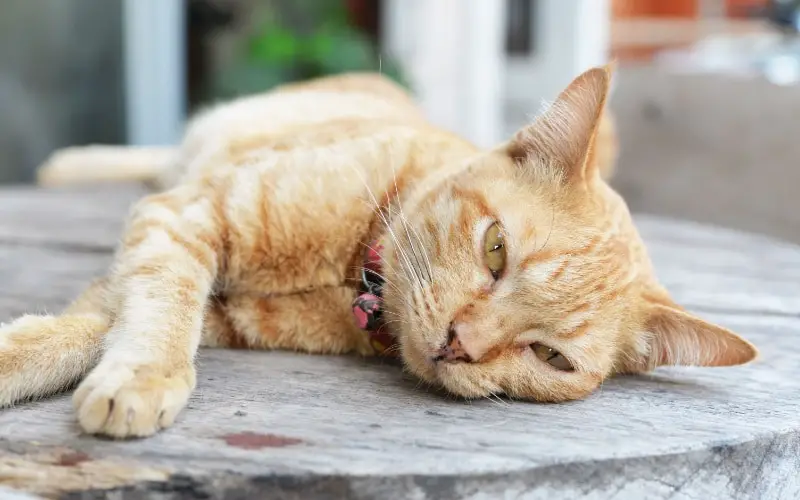

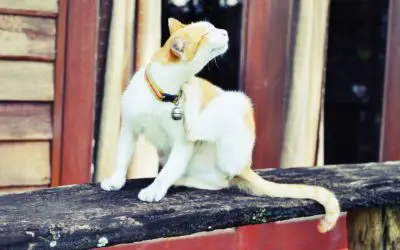

It’s good to know that cats may lose interest in food if they are near the end of their life. My cat is 18, and I noticed this morning that she didn’t eat any of her food. That’s not really like her, so I’ll make an appointment at the vet for her ASAP.
My cat is 18 and she’s an outside cat never and affection types of the time she mess with it was when you were feeding her she doesn’t want to be around her now she crawled back into place this far away I told her out and gave her some water today but she’s drinking but won’t eat respiration is shallow and doesn’t seem to be in pain but she seems just want to be left alone I love her she wasn’t a very affectionate cat but she was a beautiful cat I’m going to miss her and she’s gone
Hugs and Kleenex to fellow pet parents in the same sad boat. I said goodbye to my almost 18-year-old teddy bear 2-16-22. His last night, he felt comforted sitting under a blanket with me, while I petted and talked softly to him until morning. I even played some anti-anxiety cat music. The vet came at noon, and he went peacefully without pain in his favorite chair. He had been diagnosed with congestive heart failure 2 years earlier, and meds kept him with us that extra time, but he rapidly deteriorated on 2-14, so it was clear by the morning of 2-16 that we needed to help him across the bridge. I’m so grateful for his companionship through the years and that we were able to let him go with dignity.
Thank you so much for your clear advice.
My heart is breaking as I accompany my dearest friend in his final days.
I definitely recommend the kind words you can say to your pet. And to be present. I put my head against my good-natured Licorice Cat and he purred. He hasn’t eaten for 10 days but has had some water.
He has brought me so much joy over the past 16 years. I hope to ease his suffering. He deserves it so much, but it’s not easy.
Sweet Lady, my cat too, is on his last days. Goo goo is eating very bland canned dogwood, and drinking a little, but not very much of either. His breathing is labored, and little kitty only moves when he has to. I put him on a soft, folded blanket in the hallway and am checking on him hourly to give him cheek strokes. I’m in pain, wondering if I should finally have him put down today. My Goo goo is 20 years old. My heart aches for you, I know the pain you feel, I’m trying hard to mot keep crying. Take care dear.
My cat is now going through the same thing 😭😭😭 I am just praying that she gets better and makes it another year… Just wondering, did your cat survive out of this or didn’t?